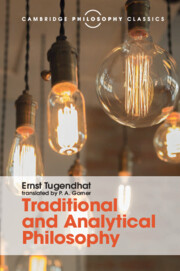Book contents
- Frontmatter
- Dedication
- Contents
- Preface
- Preface
- Translator's preface
- Part I Introduction: confrontation of analytical philosophy with traditional conceptions of philosophy
- Part II A first step: analysis of the predicative sentence
- 8 Preliminary reflections on method and preview of the course of the investigation
- 9 Husserl's theory of meaning
- 10 Collapse of the traditional theory of meaning
- 11 Predicates: the first step in the development of an analytical conception of the meaning of sentences. The dispute between nominalists and conceptualists
- 12 The basic principle of analytical philosophy. The dispute continued. Predicates and quasi-predicates
- 13 The meaning of an expression and the circumstances of its use. Dispute with a behaviouristic conception
- 14 The employment-rule of an assertoric sentence. Argument with Grice and Searle
- 15 Positive account of the employment-rule of assertoric sentences in terms of the truth-relation
- 16 Supplements
- 17 ‘And’ and ‘or’
- 18 General sentences. Resumption of the problem of predicates
- 19 The mode of employment of predicates. Transition to singular terms
- 20 What is it for a sign to stand for an object? The traditional account
- 21 The function of singular terms
- 22 Russell and Strawson
- 23 What is ‘identification’?
- 24 Specification and identification. Specification and truth
- 25 Spatio-temporal identification and the constitution of the object-relation
- 26 Supplements
- 27 Results
- 28 The next steps
- Bibliography
- Index of names
- Index of subjects
21 - The function of singular terms
from Part II - A first step: analysis of the predicative sentence
Published online by Cambridge University Press: 05 August 2016
- Frontmatter
- Dedication
- Contents
- Preface
- Preface
- Translator's preface
- Part I Introduction: confrontation of analytical philosophy with traditional conceptions of philosophy
- Part II A first step: analysis of the predicative sentence
- 8 Preliminary reflections on method and preview of the course of the investigation
- 9 Husserl's theory of meaning
- 10 Collapse of the traditional theory of meaning
- 11 Predicates: the first step in the development of an analytical conception of the meaning of sentences. The dispute between nominalists and conceptualists
- 12 The basic principle of analytical philosophy. The dispute continued. Predicates and quasi-predicates
- 13 The meaning of an expression and the circumstances of its use. Dispute with a behaviouristic conception
- 14 The employment-rule of an assertoric sentence. Argument with Grice and Searle
- 15 Positive account of the employment-rule of assertoric sentences in terms of the truth-relation
- 16 Supplements
- 17 ‘And’ and ‘or’
- 18 General sentences. Resumption of the problem of predicates
- 19 The mode of employment of predicates. Transition to singular terms
- 20 What is it for a sign to stand for an object? The traditional account
- 21 The function of singular terms
- 22 Russell and Strawson
- 23 What is ‘identification’?
- 24 Specification and identification. Specification and truth
- 25 Spatio-temporal identification and the constitution of the object-relation
- 26 Supplements
- 27 Results
- 28 The next steps
- Bibliography
- Index of names
- Index of subjects
Summary
At the end of the last lecture it again became clear how limited the possibilities of internally refuting a philosophical basic conception are. One cannot show – assuming one is prepared to accept the uncashed metaphor of the representation-concept – that a representation-theory is impossible. Sponge-like thoughts have the advantage that they cannot be smashed. But to demand an internal refutation would also involve an unrealistic view of the extent to which obsolete philosophical ideas can be put out of action. It is enough to show that the object-relation which we encounter when we examine how we actually establish for which object a sign stands is not a representation-relation and that the meaning of objecthood which emerges from this examination cannot be understood in terms of representation. The genuine refutation of the traditional conception cannot be accomplished internally but only by means of the positive construction of a new conception which right from the start can claim the advantage that it takes its departure from an actual form of reference to objects, namely that by means of linguistic expressions (for the present I leave it open whether it is the only one). The traditional conception is thus not shown to be impossible but – disregarding the unclarity of its basic concept – only false.
Before I begin the positive construction of the new conception I wish to add something to what I said about the representation-theory. I have shown that the doctrine of the primacy of proper names over descriptions, which implies that ‘standing for’ is to be understood as simple assignment or association, is grounded, if it has any philosophical foundation, on the representation-theory. However, it would be false to suppose that the converse holds, viz. that the representation-theory necessarily leads to this conception of the name-relation and such a simplistic object-concept. That it need not do so is particularly well illustrated by the case of Husserl. Husserl's object-theory is, on the one hand, a representation-theory: what he calls intentionality is the not linguistically but representationally construed object-relation of consciousness. On the other hand, we have already seen that Husserl follows Frege in thinking that descriptions are semantically more fundamental than proper-names.
- Type
- Chapter
- Information
- Traditional and Analytical PhilosophyLectures on the Philosophy of Language, pp. 294 - 306Publisher: Cambridge University PressPrint publication year: 2016

